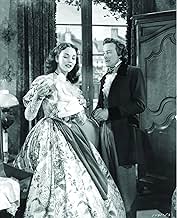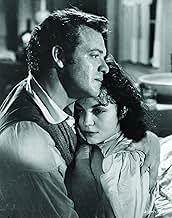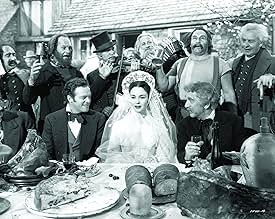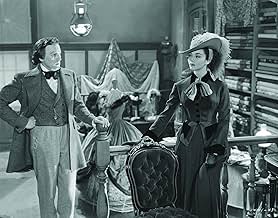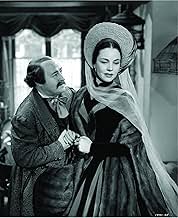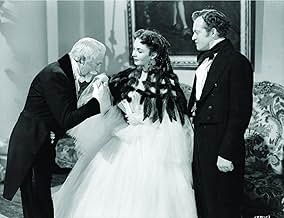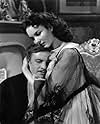IMDb RATING
7.0/10
3.2K
YOUR RATING
A provincial doctor's wife's romantic illusions about life and social status lead her to betray her naive husband, take on lovers, and run up ruinous debts.A provincial doctor's wife's romantic illusions about life and social status lead her to betray her naive husband, take on lovers, and run up ruinous debts.A provincial doctor's wife's romantic illusions about life and social status lead her to betray her naive husband, take on lovers, and run up ruinous debts.
- Director
- Writers
- Stars
- Nominated for 1 Oscar
- 2 wins & 1 nomination total
Alf Kjellin
- Leon Dupuis
- (as Christopher Kent)
Harry Morgan
- Hyppolite
- (as Henry Morgan)
- Director
- Writers
- All cast & crew
- Production, box office & more at IMDbPro
Featured reviews
Though I'm sure that the various French dramatizations of Madame Bovary are probably superior to this film, this English language version that MGM did in 1949 is as good as any we would have gotten from Hollywood. of that era. Jennifer Jones, Van Heflin, Louis Jourdan, and James Mason were unfortunately hampered by the Code in this version.
MGM's version incorporates the author right into his story. James Mason plays Gustave Flaubert and the film opens with him on trial for authoring indecent material as the French censors of the day saw Madame Bovary. While on the witness stand defending his work, he tells the story of his creation Emma Bovary, a girl with silly romantic notions who brings tragedy all around because of them.
Jennifer Jones is Emma and imagine Bernadette Soubirous who instead of having a divine experience has the misfortune to have other things peak her interest as an adolescent. She reads a whole lot of romantic novels who give her exaggerated notions about the nature of love.
She lives in a pretty dull town in Normandy which was also where Flaubert himself hailed from and which he satirizes in acid in this work. She marries solid, dependable Van Heflin who's a doctor and who she hopes will give her a better life.
It's in Heflin's character that the Code watered down what Flaubert was trying to say. Here he's an upright guy, a lot on the dull side, but dependable. In the novel he's as much desiring of social climbing as Jones is. In fact in the film he refuses to perform an operation that might gain him fame and success because he knows he's not qualified to do it. In the novel he does the operation and it ends in disaster all around.
Jones takes lovers Louis Jourdan and Alf Kjellin and runs up bills that put Heflin into financial disaster. All the while refusing to face the truth about life and herself.
Given the Code restrictions director Vincente Minnelli does as best as he can with his cast. James Mason makes a brilliant and erudite Flaubert on the stand. But considering he was on trial for indecency by not showing the alleged indecency to the fullest the Code defeated what could have been a classic.
MGM's version incorporates the author right into his story. James Mason plays Gustave Flaubert and the film opens with him on trial for authoring indecent material as the French censors of the day saw Madame Bovary. While on the witness stand defending his work, he tells the story of his creation Emma Bovary, a girl with silly romantic notions who brings tragedy all around because of them.
Jennifer Jones is Emma and imagine Bernadette Soubirous who instead of having a divine experience has the misfortune to have other things peak her interest as an adolescent. She reads a whole lot of romantic novels who give her exaggerated notions about the nature of love.
She lives in a pretty dull town in Normandy which was also where Flaubert himself hailed from and which he satirizes in acid in this work. She marries solid, dependable Van Heflin who's a doctor and who she hopes will give her a better life.
It's in Heflin's character that the Code watered down what Flaubert was trying to say. Here he's an upright guy, a lot on the dull side, but dependable. In the novel he's as much desiring of social climbing as Jones is. In fact in the film he refuses to perform an operation that might gain him fame and success because he knows he's not qualified to do it. In the novel he does the operation and it ends in disaster all around.
Jones takes lovers Louis Jourdan and Alf Kjellin and runs up bills that put Heflin into financial disaster. All the while refusing to face the truth about life and herself.
Given the Code restrictions director Vincente Minnelli does as best as he can with his cast. James Mason makes a brilliant and erudite Flaubert on the stand. But considering he was on trial for indecency by not showing the alleged indecency to the fullest the Code defeated what could have been a classic.
I thought this movie was great and should be seen by all women and girls. I think it had a great message of how greed and envy can consume a person. I think that a lot of women suffer from this kind of wander lust. Jennifer Jones' Madame Bovary reminds me of Scarlett O'Hara in Gone with the Wind. Both women wanting what they can't have and not appreciating the men who truly love them or their beautiful little girls. This movie also teaches the evils of over extending oneself on credit! Van Heflins portrayal of Dr. Bovary is a little weak but then so was the character, so maybe he didn't do so bad. I loved the costumes in Madame Bovary. Call me an old fashioned girl but I just loved this movie and the old fashioned message.
Gustave Flaubert's Madame Bovary is beautiful and shocking, one of the European literary greats. While it is not the most faithful adaptation around, Vincente Minnelli's Madame Bovary does stand on its own two feet and is a beautiful film in its own right. It does suffer from what made the book so complex and shocking not being fully allowed to come out due to the limitations of the Production Code at the time of it being made and released(maybe the film's length too). So you do miss the stuffiness and hypocrisy of French provincial life, which I always took as a crucial part to Emma's character, while the script could have done with more of a dark edge and Minnelli's direction is often dazzling and technically skilled(the ballroom sequence has to be a highlight in his directorial career) but also a little too relaxed in places, so the drama has occasional stodginess. But it is unfair to dismiss Madame Bovary due to these because its positives are a great many. That it is one of the most visually beautiful films of the 40s is one, the costumes are evocative and astonishingly elegant, Emma's dresses are a wow factor while the sets are the very meaning of grand with a Baroque/Roccocco influence. The photography dazzles just as much as Minnelli's technical style in the ballroom sequence(an intricate and in all senses wonderful scene, perhaps one of the greats in cinematic history). Miklos Rosza's music score is another huge part of the appeal, one of his best, the stylistic elegance, haunting undercurrent and energy are all here in the score, the Madame Bovary Waltz being the most memorable.
The script may lack edge, but it does maintain the book's ironic humour and is very poignant too without descending into melodrama, and the story regardless of the watering down still compels and moves. Some may find Flaubert's narration and trial at the beginning unnecessary, to me it was actually very interesting- James Mason's thoughtfully earnest performance as Flaubert helps- and that the book itself caused a scandal at the time and is still controversial now made it further easier to understand why the book's depth doesn't quite come through here. The aforementioned ballroom sequence is the highlight of the film, but the deserted windswept streets in the middle of the night scene where Emma is waiting for Rudolphe is beautifully shot and emotionally telling. The performances are fine, Jennifer Jones is very moving(not to mention stunning to look at), she does capture the selfishness and insufferable woman traits that Emma has yet makes it clear Emma is also a victim of her own passions, it is very easy to not stand Emma and make her one-dimensional but with Jones there is a degree of compassion. Van Heflin is sympathetic and mild-mannered without being too much of a bore and oafish without being too much of a dork and clown, like with Jones both of those are easy traps to fall into. Louis Jourdan is perfectly cast, suave and charismatic while conflicted and menacing. Alf Kjellin is a gentle Leon, a good contrast to Jourdan's Rudolphe, while Gladys Cooper as ever is a scene stealer as is Frank Allenby as the malefic L'Hereux. Harry Morgan and Gene Lockhart are dependably solid. Overall, a beautiful film but those wanting a faithful adaptation of Madame Bovary(a big ask really as it is perhaps one of the most difficult books to adapt) may want to look elsewhere. But even then, there will be people who think that to some extent but still take this film for what it is. 8/10 Bethany Cox
The script may lack edge, but it does maintain the book's ironic humour and is very poignant too without descending into melodrama, and the story regardless of the watering down still compels and moves. Some may find Flaubert's narration and trial at the beginning unnecessary, to me it was actually very interesting- James Mason's thoughtfully earnest performance as Flaubert helps- and that the book itself caused a scandal at the time and is still controversial now made it further easier to understand why the book's depth doesn't quite come through here. The aforementioned ballroom sequence is the highlight of the film, but the deserted windswept streets in the middle of the night scene where Emma is waiting for Rudolphe is beautifully shot and emotionally telling. The performances are fine, Jennifer Jones is very moving(not to mention stunning to look at), she does capture the selfishness and insufferable woman traits that Emma has yet makes it clear Emma is also a victim of her own passions, it is very easy to not stand Emma and make her one-dimensional but with Jones there is a degree of compassion. Van Heflin is sympathetic and mild-mannered without being too much of a bore and oafish without being too much of a dork and clown, like with Jones both of those are easy traps to fall into. Louis Jourdan is perfectly cast, suave and charismatic while conflicted and menacing. Alf Kjellin is a gentle Leon, a good contrast to Jourdan's Rudolphe, while Gladys Cooper as ever is a scene stealer as is Frank Allenby as the malefic L'Hereux. Harry Morgan and Gene Lockhart are dependably solid. Overall, a beautiful film but those wanting a faithful adaptation of Madame Bovary(a big ask really as it is perhaps one of the most difficult books to adapt) may want to look elsewhere. But even then, there will be people who think that to some extent but still take this film for what it is. 8/10 Bethany Cox
Jennifer Jones was a star I knew well from visits to the cinema with my family during the 1950's: "The Man in the Grey Flannel Suit", "The Barretts of Whimpole Street", "Love is a Many Splendored Thing" and "A Farewell to Arms".
I cut in on her at a certain stage in her career. She was a bit older than my mum, and although I liked her she didn't have the effect on a prepubescent lad that Yvette Mimieux or Tuesday Weld were having.
It wasn't until later, when we got television, that I saw the movies she made earlier in her career; "Song of Bernadette, "Duel in the Sun", "Portrait of Jennie", "Carrie" and this one: Vincente Minnelli's "Madame Bovary". What an absolute stunner she was.
Emma Bovary (Jennifer Jones) is the beautiful daughter of a poor French family, but she has an overactive imagination fostered by romantic novels.
She marries a country doctor Charles Bovary (Van Heflin) who she doesn't really love hoping to advance her standing in society and pursue her romantic dreams. However she soon outspends her husband's capacity to earn. In an era before credit cards, she maxes-out on credit notes.
Emma attracts men like moths to a flame, and cheats on her husband who still loves her despite everything. There are tears before the final fade out.
The film is bookended with the trial of Gustave Flaubert who wrote the original novel. Apparently the story so outraged the French hierarchy that they took old Gustave to court. He got off and of course the book became a bestseller.
The filmmakers used the trial to allow Gustave (James Mason) to narrate the story - quoting passages of Flaubert's prose. Although narration can be a lazy device in film, in this case, Mason's mellifluous voice puts us in the picture quickly. More importantly, Emma is seen sympathetically despite being hopelessly self-focused.
Two actors added the final touch of class to the 1949 version. Van Heflin is such a nice guy here that we are waiting for someone to smack Emma to her senses. Louis Jordan gives another variation on that smooth roué he played in "Letter to an Unknown Woman" - a not dissimilar drama.
Composer Miklos Rozsa surpassed himself with the score. With its beautiful main theme for Emma and flowing melodies it sweeps you along.
A 2014 version did away with narration. It's more low-key, but quite good with a totally different vibe to the Minnelli version. It was filmed in France and is more explicit with a fair bit of nudity. Jennifer Jones was fortunate that her movie career was in an era where she didn't have to worry about getting in shape for that kind of thing.
I cut in on her at a certain stage in her career. She was a bit older than my mum, and although I liked her she didn't have the effect on a prepubescent lad that Yvette Mimieux or Tuesday Weld were having.
It wasn't until later, when we got television, that I saw the movies she made earlier in her career; "Song of Bernadette, "Duel in the Sun", "Portrait of Jennie", "Carrie" and this one: Vincente Minnelli's "Madame Bovary". What an absolute stunner she was.
Emma Bovary (Jennifer Jones) is the beautiful daughter of a poor French family, but she has an overactive imagination fostered by romantic novels.
She marries a country doctor Charles Bovary (Van Heflin) who she doesn't really love hoping to advance her standing in society and pursue her romantic dreams. However she soon outspends her husband's capacity to earn. In an era before credit cards, she maxes-out on credit notes.
Emma attracts men like moths to a flame, and cheats on her husband who still loves her despite everything. There are tears before the final fade out.
The film is bookended with the trial of Gustave Flaubert who wrote the original novel. Apparently the story so outraged the French hierarchy that they took old Gustave to court. He got off and of course the book became a bestseller.
The filmmakers used the trial to allow Gustave (James Mason) to narrate the story - quoting passages of Flaubert's prose. Although narration can be a lazy device in film, in this case, Mason's mellifluous voice puts us in the picture quickly. More importantly, Emma is seen sympathetically despite being hopelessly self-focused.
Two actors added the final touch of class to the 1949 version. Van Heflin is such a nice guy here that we are waiting for someone to smack Emma to her senses. Louis Jordan gives another variation on that smooth roué he played in "Letter to an Unknown Woman" - a not dissimilar drama.
Composer Miklos Rozsa surpassed himself with the score. With its beautiful main theme for Emma and flowing melodies it sweeps you along.
A 2014 version did away with narration. It's more low-key, but quite good with a totally different vibe to the Minnelli version. It was filmed in France and is more explicit with a fair bit of nudity. Jennifer Jones was fortunate that her movie career was in an era where she didn't have to worry about getting in shape for that kind of thing.
Jennifer Jones is "Madame Bovary" in this 1949 adaptation of Flaubert's novel, directed by Vincente Minnelli and also starring Van Heflin, James Mason, Louis Jourdan, Gene Lockhart, Alf Kjellin and Ellen Corby.
The film starts with Flaubert, on trial for indecency. As he defends the book, he tells the story of Emma Bovary, a delusional young woman living on a farm who, from romantic novels, has unrealistic ideas about love and happiness.
She nabs a simple country doctor (Van Heflin) and proceeds to buy herself an incredible wardrobe and live as a rich woman, even though she and her husband are not wealthy. She has a little girl whom she ignores, leaving her to the nurse (Corby).
Emma soon becomes bored and attempts to seduce a young man (Kjellin), but his mother (Gladys Cooper) catches on and sends him to Paris. Then she meets Boulanger (Jourdan) at a party, becomes his lover and plans to run away with him to Italy - but he sees what high maintenance she is and takes off without her.
In an attempt to make her husband more prominent, she attempts to talk him into performing a new surgery, but he refuses (in the book, however, he's ambitious as well and does the surgery, which is a failure).
Meanwhile, unbeknownst to her husband, she owes a fortune, and if she doesn't find a way out, the family is due to lose their home and furnishings.
"Madame Bovary" is one of the most stunning films ever made, with a captivating performance by Jones who makes Emma pathetic, desperate, frantic and sympathetic.
As one of the comments on the board pointed out, it's easy to make Emma unlikable. With Jones' natural charm making her likable and somewhat sweet, we can see ourselves in Emma.
She has great backup from Heflin as her cowed husband. Jourdan is handsome and arrogant - he sees his future with Emma, and he doesn't like it.
Minnelli handles every detail beautifully in this film. Not enough can be said about the waltz at the party, its dizzying effects making it one of the most thrilling scenes on film. When Emma later puts on the same gown and looks in the mirror and remembers that night, we know for her it was the ultimate dream evening, when she become one with the heroines of the novels she read.
The gowns - well, there have been beautiful gowns in films - the 1938 Marie Antoinette comes to mind - and, as in that film, these gowns are works of art, particularly the white ball gown. When Boulanger returns from Italy, and Emma goes to see him, she actually looks different - tired and older - the subtlety of the makeup is spectacular.
Though set in France in the mid-1800s, Madame Bovary is a classic because it deals with an ordinary person so dazzled by illusion that she cannot accept anything about her life as it exists.
How apropos for today, when the media bludgeons us with multimillion dollar homes, heiresses who go to parties every night, size zero, red carpet premieres - it's hard to be happy when you're a housewife in sweats paying $4 a gallon for gas.
Even before films, television, the tabloids and the Internet, people weren't satisfied with their lives because they were told to compare their inside with someone else's outside and found themselves not measuring up.
"Madame Bovary" isn't an immorality tale, it's a morality tale and, of course, Flaubert was acquitted. It's considered one of the two greatest novels ever written, along with Anna Karenina, and it's perfectly adapted for film in the 1949 version - the story of a woman who thinks that shopping on credit till she drops is the way to real happiness. Like many in the 20th and 21st centuries have found, she was wrong.
The film starts with Flaubert, on trial for indecency. As he defends the book, he tells the story of Emma Bovary, a delusional young woman living on a farm who, from romantic novels, has unrealistic ideas about love and happiness.
She nabs a simple country doctor (Van Heflin) and proceeds to buy herself an incredible wardrobe and live as a rich woman, even though she and her husband are not wealthy. She has a little girl whom she ignores, leaving her to the nurse (Corby).
Emma soon becomes bored and attempts to seduce a young man (Kjellin), but his mother (Gladys Cooper) catches on and sends him to Paris. Then she meets Boulanger (Jourdan) at a party, becomes his lover and plans to run away with him to Italy - but he sees what high maintenance she is and takes off without her.
In an attempt to make her husband more prominent, she attempts to talk him into performing a new surgery, but he refuses (in the book, however, he's ambitious as well and does the surgery, which is a failure).
Meanwhile, unbeknownst to her husband, she owes a fortune, and if she doesn't find a way out, the family is due to lose their home and furnishings.
"Madame Bovary" is one of the most stunning films ever made, with a captivating performance by Jones who makes Emma pathetic, desperate, frantic and sympathetic.
As one of the comments on the board pointed out, it's easy to make Emma unlikable. With Jones' natural charm making her likable and somewhat sweet, we can see ourselves in Emma.
She has great backup from Heflin as her cowed husband. Jourdan is handsome and arrogant - he sees his future with Emma, and he doesn't like it.
Minnelli handles every detail beautifully in this film. Not enough can be said about the waltz at the party, its dizzying effects making it one of the most thrilling scenes on film. When Emma later puts on the same gown and looks in the mirror and remembers that night, we know for her it was the ultimate dream evening, when she become one with the heroines of the novels she read.
The gowns - well, there have been beautiful gowns in films - the 1938 Marie Antoinette comes to mind - and, as in that film, these gowns are works of art, particularly the white ball gown. When Boulanger returns from Italy, and Emma goes to see him, she actually looks different - tired and older - the subtlety of the makeup is spectacular.
Though set in France in the mid-1800s, Madame Bovary is a classic because it deals with an ordinary person so dazzled by illusion that she cannot accept anything about her life as it exists.
How apropos for today, when the media bludgeons us with multimillion dollar homes, heiresses who go to parties every night, size zero, red carpet premieres - it's hard to be happy when you're a housewife in sweats paying $4 a gallon for gas.
Even before films, television, the tabloids and the Internet, people weren't satisfied with their lives because they were told to compare their inside with someone else's outside and found themselves not measuring up.
"Madame Bovary" isn't an immorality tale, it's a morality tale and, of course, Flaubert was acquitted. It's considered one of the two greatest novels ever written, along with Anna Karenina, and it's perfectly adapted for film in the 1949 version - the story of a woman who thinks that shopping on credit till she drops is the way to real happiness. Like many in the 20th and 21st centuries have found, she was wrong.
Did you know
- TriviaAfter the expensive box-office failure of Le pirate (1948), director Vincente Minnelli worked hard to cut corners on this film, fearing he might be accused of extravagance. However, he devoted a great deal of time to the ball sequence, which he regarded as the most important scene in the film; he even had composer Miklós Rózsa compose the waltz theme used in it well in advance of the start of filming.
- GoofsWhen Madame Bovary asks Leon for money, he reacts by punching out one of the glass window panes. But on the next cut, the previously shattered window pane is now intact.
- Quotes
Emma Bovary: Do you know, Charles, why that clock strikes? To announce the death of another hour.
- Alternate versionsAlso shown in a computer colorized version.
- ConnectionsFeatured in Some of the Best: Twenty-Five Years of Motion Picture Leadership (1949)
- How long is Madame Bovary?Powered by Alexa
Details
- Release date
- Country of origin
- Official site
- Language
- Also known as
- Madame Bovary und ihre Liebhaber
- Filming locations
- Production company
- See more company credits at IMDbPro
- Runtime
- 1h 54m(114 min)
- Color
- Aspect ratio
- 1.37 : 1
Contribute to this page
Suggest an edit or add missing content


